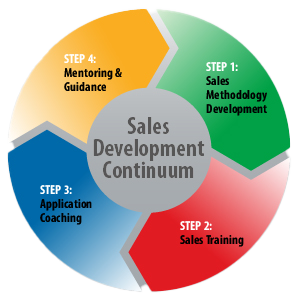The myriad of tools on the market branded as “sales enablement” solutions can often make it confusing to understand what resources your sales team needs to be effective. So, let’s start by clarifying that sales enablement is the act of providing your sales team with resources that help them generate business.
This definition simplicity isn’t intended to discount the importance of enablement initiatives because they are critical to your sales success. I only mean to say that sales enablement can take various forms, from a defined sales process or call scripts to content marketing pieces and internal sales support resources.
Yes, even post-it notes on your monitor could technically count as sales enablement!

Most small and mid-sized businesses don’t have the time and resources it takes to enable their teams the way big corporations do.
With that in mind, my goal for this article is to help top executives in smaller business settings understand practical ways to leverage sales enablement strategies to equip sellers for next-level performance.
What is Direct and Indirect Sales Enablement?
Sales enablement tools can be divided into two categories: direct and indirect.
Direct enablement encompasses resources used by salespeople in the course of executing in their selling roles. This includes technology tools such as a CRM system but also encompasses processes and methodology that guides their selling approach.
Indirect enablement, on the other hand, includes elements not directly tied the seller’s actions but that indirectly supports their success. This can range from things like inside sales resources to marketing collateral to lead generation strategies, and even your company website.

The key benefit of direct sales enablement is its positive impact on sales efficiency and effectiveness, thereby allowing salespeople to focus more on selling and empowering them to identify and close deals faster.
For instance, a well-defined sales process provides sellers and supporting resources with a proven method to navigate new opportunities.
I’ve found the sales teams that perform with predictability are usually the ones who have a sales leader that has taken the time to develop an intentional, customized sales process for their teams to follow.
A previous article I wrote, “Does Your Sales Process Generate Predictable Results?”, provides helpful guidance on developing this high-impact sales lever.
Other direct enablement tools like email templates or call scripts can provide a solid starting point for sales prospecting, ensuring a consistent message with strong value positioning across the sales team. It reduces the time invested in content creation, enabling faster and more productive outreach.
Indirect sales enablement, while not directly involved in the selling process, plays a vital role in creating an environment conducive to sales success. For instance, marketing efforts such as brand building, product positioning, and content creation create a favorable perception of your products or services, making it easier for the sales team to generate interest from a new prospect.
Lead generation strategies, another example of indirect enablement, fuel the sales pipeline with potential customers. Whether it’s through trade show exhibiting, increased website traffic, social media campaigns, or paid advertising – all these efforts drive leads to your business.
An effective lead generation approach will provide your sales team with a steady stream of qualified leads to convert into revenue. That said, it’s important to set the right expectations with your sellers to ensure they play an active role in lead generation, not merely lead recipients.
If you’re looking to create more cohesion between your sales and marketing functions, you may find my article, “How Do I Engage Sales in Lead Generation?”, an insightful resource.
How Can I Implement Sales Enablement Strategies?
The challenge for small to mid-sized businesses is choosing the right sales enablement strategies and effectively implementing them. It’s not viable to devote an entire department to sales enablement, or even one dedicated resource in small settings.
The other difficulty is the depth of sales leadership experience needed to effectively prioritize and evaluate the plethora of sales enablement options available. Not all tactics are applicable to every business type.

As a Fractional Sales Leader, I help owners and top executives optimize their sales team by equipping them with the right enablement strategies to yield maximum impact on their bottom line.
When it comes to implementing new sales enablement tools, understanding your objectives and garnering adoption from your team is critical.
The aim here is not merely to introduce a new sales tool and expect it to fix everything, but rather to make sure the tool, process or methodology makes it easier for your team to generate revenue.
Sales training plays a crucial role in effective sales enablement implementation. But remember – as outlined in my prior article, “Sales Training Is Only Part of the Answer”, sales training effectiveness as a stand-alone is greatly diminished.
In order to realize ROI on new sales concepts/tools, you need to “work” the sales development continuum wheel to drive sales team adoption and effective application in your unique sales environment.
Is Your Sales Enablement Working?
Measuring the success or effectiveness of sales enablement efforts is vital. It’s about finding a Key Performance Indicator (KPI) that reflects or directly contributes to your Return on Investment (ROI).
For instance, consider a tool that streamlines internal communication between you, your sellers, and internal support resources. While communication efficiency improvement may not reflect immediate sales increase, it can lead to a more unified and efficient team, which will likely indirectly drive sales growth.
In such cases, you might measure the tool’s effectiveness in terms of reduced time spent in internal meetings or decrease in internal email communication.

Moreover, targeted marketing campaigns might improve the quality of leads rather than the quantity, leading to higher conversion rates. Here, you might measure success not in terms of the number of leads generated, but the percentage of them entering the sales pipeline as qualified opportunities.
In other words, the “intended purpose” of the tool should be your guide when establishing your measuring metrics. Not all tools will directly increase revenue, but they can still be invaluable in creating an environment that drives increased sales success.
Enhancing Your Bottom-Line with Fractional Sales Leader Help

I’ve covered a range of sales enablement aspects in this article. You can probably appreciate why my approach in helping a client tackle enablement begins with a discovery and assessment process.
My objective is to clearly define your current state, unique sales challenges, and revenue growth potential. With this understanding, I can sift through the multitude of strategies to recommend the ones that are most suitable for your unique circumstances.
It’s important not to blindly follow trends or default to adopting the most popular tools. Instead, selecting the strategies that will truly empower your sales team, and investing yourself to drive results through them, is how you’ll get the best pay-off for your business.
My goal is to help you navigate the complex landscape of sales enablement and pick the right tools and tactics that will lead to substantial growth and success.
Your sales performance can reach new heights – and I am here to facilitate that journey. Let’s work together to boost your business.
If you’d like to discuss the improvement you’re looking for in your business, contact me through any of these methods: (321) 229-8910 or smuniz@salesxceleration.com.
I also welcome you to take my Sales Leadership Assessment to gain visibility into how your skills rank in 10 high-impact areas. This self-serve tool was custom developed to help you improve!
———————————————————————————–
I am part of a national group of Senior Sales Leaders who collaborate to share insights like the examples shown in this article. We formed because of our shared passion to help business leaders exponentially grow their revenue.



